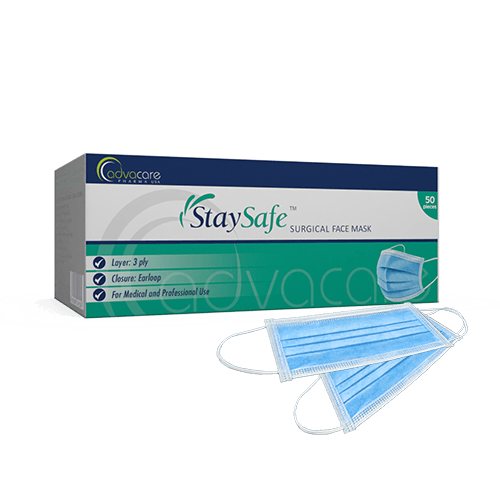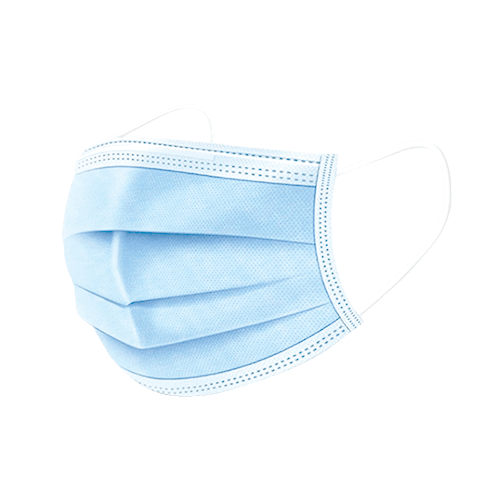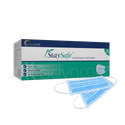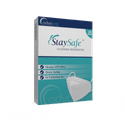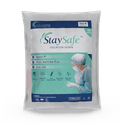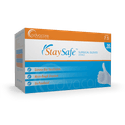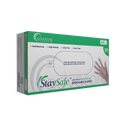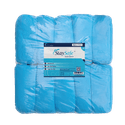- Home›
- Medical Devices›
- Medical Disposables›
- Personal Protective Equipment (PPE)›
- Surgical Face Mask
Surgical Face Mask
Material
BFE
Sterilization
Closure
Packaging
What is a Surgical Face Mask?
A Surgical Face Mask is a type of personal protective equipment (PPE) used to cover the nose and mouth. It helps to shield both the wearer and others from transferring respiratory droplets, bacteria, and other infectious agents. This style of mask is often used in medical facilities like hospitals or laboratories.
This type of face mask may also be called a medical mask or a procedure mask. They are designed with either ear loops or ties to secure them in place over the nose and mouth.
Disposable surgical face masks are made from a 2-ply non-woven fabric with BFE (Bacterial Filtration Efficiency) ≥ 98%. They are available as either sterile or non-sterile.
Surgical Face Masks are manufactured by AdvaCare Pharma, an American-owned pharmaceutical company with extensive experience in worldwide distribution. These medical-grade face masks are produced in CE/ISO-certified facilities, where regular inspections guarantee that our facilities and our products meet stringent health, safety, and environmental standards.
Product Specifications
Material
BFE
Closure
3-Ply: Non-Woven Fabric + Filter Paper + Non-Woven Fabric
3-ply: non-woven fabric + filter paper + non-woven fabric features enhanced protection against airborne particles. In addition to the outer and inner layers of non-woven fabric, a 3-ply mask also includes a layer of filter material in the middle. The filter layer is typically made from a meltblown polypropylene material, which is designed to trap small particles and bacteria.
Bacterial Filtration Efficiency (BFE) ≥98%
With a Bacterial Filtration Efficiency (BFE) ≥98%, the 3-ply surgical face mask is designed to filter at least 98% of the bacteria present in the air. This rating is a measure of the mask's ability to block the passage of bacteria through the mask material and into the wearer's respiratory system. This type of mask meets the highest requirements for surgical masks (type IIR).
Ear Loop
Ear Loop closures are made from elastic or spandex, which provides a flexible and snug fit around the ears. This stretchy material used for the ear loops enables easy use and removal of the mask, which offers a more comfortable experience for the wearer.
The ear loops maintain their shape and hold the mask securely in place during use, allowing for uninterrupted protection.

Tie-on
Tie-on face masks are designed to be secured to the face using two sets of ties attached to the mask. The ties are made of a soft and non-irritating material, such as cotton, that allows for a secure and comfortable fit. With the ability to adjust the ties according to individual preferences, tie-on masks offer added versatility and comfort for the individual wearing the masks.

Why are we a top Surgical Face Mask manufacturer?
AdvaCare Pharma is a leading global manufacturer of Surgical Face Masks and other PPE medical disposables. Each of our products is accompanied by a comprehensive STED dossier, instilling confidence in our partners and distributors that our medical supplies consistently meet the highest standards of quality.
Drawing upon over two decades of industry experience, we have developed a distribution network that extends to 65 markets across the globe. Our business model is focused on creating a strong partnership with our distributors, and our professional team offers unbeatable assistance throughout the entire process - from supply chain coordination to registration support.
Uses
What is a Surgical Face Mask used for?
A Surgical Face Mask is used to provide a protective barrier over the mouth and nose in order to reduce the transmission of infectious particles. These masks are primarily used in medical settings, such as hospitals, clinics, and laboratories, to prevent the spread of pathogens during surgical procedures or high-risk situations.
They are utilized by healthcare professionals, as well as patients, to minimize the risk of contamination and protect against respiratory droplets and other infectious agents.
How should a Surgical Face Mask be worn?
To wear a Surgical Face Mask, steps should be followed to guarantee both the wearer's and others' safety:
- Before putting on the mask, clean the hands thoroughly using soap and water or hand sanitizer. This prevents contamination during the mask application.
- The mask should then be carefully positioned over the nose and mouth, checking it covers both areas completely.
- For masks with ear loops, the loops should be secured around the ears, while tie-on masks should have their strings tied securely behind the head.
Are there any storage recommendations for unused Surgical Face Masks?
Unused Surgical Face Masks should be stored in a clean and dry environment to retain their efficacy. It is advised to keep them away from direct sunlight and sources of heat, as exposure to these elements can potentially affect the integrity of the masks.
Storing the masks in their original packaging is advisable, as it helps prevent contamination and they remain in the ideal condition until they are ready for use. Proper storage is advisable so that the masks provide adequate protection when needed.
How should used Surgical Face Masks be disposed of?
The adequate disposal of used Surgical Face Masks is required to prevent potential contamination and maintain hygiene. It is recommended to consult local regulations and guidelines to determine the appropriate disposal method for these masks.
In general, used disposable face masks should be carefully removed from the face without touching the front surface to minimize the risk of contact with any potentially infectious particles.
Once removed, the masks should be promptly discarded in a designated waste bin. Disposing of used masks in accordance with local waste management protocols encourages the safe and responsible disposal of potentially contaminated materials.
How do doctors use Surgical Face Masks?
Doctors use Surgical Face Masks as part of their personal protective equipment (PPE) when performing surgical procedures or working in medical settings. They wear these masks to protect themselves and their patients from the transmission of infectious particles, respiratory droplets, and other contaminants. Surgical masks help to keep a sterile environment in the operating room and reduce the risk of cross-contamination during medical procedures.
How do Surgical Face Masks boost infection control?
Surgical Face Masks aid in infection control by serving as a primary defence against the spread of infectious diseases in healthcare settings. These masks act as a physical barrier, blocking respiratory droplets and infectious particles that may carry bacteria and viruses.
Surgical Face Masks contribute to the maintenance of a sterile environment in surgical suites, isolation units, clinics, and other medical settings. They help reduce the transmission of infections, elevating patient safety and overall healthcare quality.
FAQs
Are Surgical Face Masks suitable for medical use?
Surgical face masks are recommended for use in medical settings. They are certified to filter at least 98% of the bacteria present in the air, providing a high level of protection against airborne particles, bodily fluids, and splashes.
Can Surgical Face Masks be reused?
Surgical face masks are intended for single use. The mask should be worn for one procedure or shift and then disposed of in order to maintain hygiene and prevent cross-contamination.
What material is used for Surgical Face Masks?
Surgical face masks are made of a 3-ply construction, which includes layers of non-woven fabric, a filter paper layer, and another layer of non-woven fabric. The non-woven fabric layers are designed to be breathable and help block larger particles, while the filter paper is designed to provide additional filtration and trap smaller particles.
What are the typical shelf life and expiration dates for your medical devices?
The shelf life and expiration dates for our medical devices vary depending on the product and its storage conditions. Most Class I and Class II medical devices have a shelf life ranging from 3 to 5 years. Detailed information is provided with each product.
What distinguishes your Surgical Face Masks from others on the market?
- Superior Protection: Our surgical masks provide exceptional barrier protection against airborne particles, droplets, and contaminants, reducing the risk of infection and transmission of illness.
- Comfortable Fit: Designed for comfort, our masks feature soft, non-woven materials and adjustable nose clips to ensure a snug and comfortable fit for all users, minimizing gaps and enhancing protection.
- Breathability: Made from breathable materials, our masks allow for easy breathing while still providing effective filtration, reducing the risk of discomfort or overheating during extended wear.
- Fluid Resistance: Our masks are designed to resist fluids and splashes, providing an additional layer of protection for healthcare professionals and individuals in high-risk environments.
- Multiple Layers: Our masks feature multiple layers of filtration, including melt-blown fabric and non-woven materials, to provide enhanced protection against airborne particles and contaminants.
Are your Surgical Face Masks compliant with international regulatory standards?
Our medical devices are specifically developed to align with worldwide regulatory requirements, including CE, ISO, and USFDA certifications, delivering unparalleled safety and efficacy across the globe.
Is it challenging to import Class II medical devices for distribution?
Importing Class II medical devices may require navigating more stringent regulatory requirements, yet with proper documentation and compliance, it is feasible. Our Regulatory Affairs Department supports distributors in efficiently registering Class II devices in their target markets.
References
Disposable surgical face masks for preventing surgical wound infection in clean surgery (Lipp, A, 2014)
This Cochrane Library review investigates the effectiveness of disposable surgical face masks in preventing surgical wound infections during clean surgeries. The primary purpose of a surgical mask is to provide protection for the patient from the surgical team's germs. The review found that there is no clear evidence that wearing a face mask increases or decreases the number of wound infections.
Disposable surgical face masks for preventing surgical wound infection in clean surgery (Multiple authors, 2021)
This article, published in the NCBI database, provides a background on the use of disposable surgical face masks in clean surgery and their potential to prevent surgical wound infections. The primary purpose of a surgical mask is to prevent the passage of germs from the surgeon's nose and mouth into the patient's wound. The article also highlights that incorrectly worn masks may increase the likelihood of wound contamination.
Optical microscopic methods for testing face mask efficacy for COVID-19
This study delves into the effectiveness of face masks, including surgical ones, by using antimicrobial materials and evaluating their effectiveness in reducing exposure to airborne pathogens, highlighting the worldwide shortage of surgical face masks.

You might be interested in...
Why AdvaCare Pharma?
As an industry leader, we are aware of our responsibility to provide affordable and sustainable solutions to improve healthcare worldwide.
